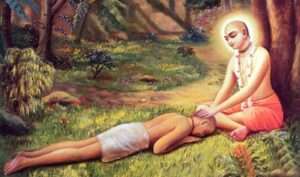The symptoms of those who are free from the ten offences
Dasaparadha sunya vyaktira laksana
Therefore, one must carefully renounce any criticism of the sadhus, a purified mind knows that Vishnu is the para-tattva[1]…
…knowing that nama-guru[2] and nama-sastra[3] are supreme, considering in the heart that the Name is transcendentally pure and spiritual…
…striving to repel the desire to engage in illicit activities, which is the seed of sin, by teaching Suddha-nama to those people who have sraddha…
…and ceasing all other activities of simple virtue, he surrenders to remembering the Name and becomes free from all inattention.
After a few days of chanting without offense, Bhava arises
Niraparadhe name laile alpa dine bhavodaya haya
Such a person is blessed in the three worlds and very fortunate. He is eligible to receive Krishna’s mercy. He is a home of good qualities.
In a few days, by chanting sri-nama, bhava will manifest and they will attain the richness of prema.
The stages of advancement
Unnati krama
After a few days, by the will of Krishna, a person at the sadhana stage reaches the bhava stage and then the prema stage. All Sastra declare this to be the highest perfection.
You have declared that a Mahajana who chants the Name without any offense will attain the wealth of prema.
Considering the opposite of this
Vyatireka bhave ihara cinta
One who chants the Holy Name but does not renounce offenses, even if he engages in thousands of disciplines, will never attain bhakti.
Jnanis and karmis should know that through jnana one attains mukti and through karma one attains bhukti (material enjoyment), but it is extremely rare for them to attain Krishna-bhakti even by performing pure sadhana.
Bhukti and mukti are like oysters, while the result of bhakti is like the pearl. The Jiva attains glory when he reaches pure bhakti.
Those devotees who become expert in the state of sadhana, the bhakti-lata[4] awards them with the fruit of prema, even after engaging in little sadhana.
Expertise in Bhajana
Bhajana naipunya
One who avoids the ten offenses while chanting the Holy Name becomes expert in sadhana and bhajana.
The gravity of Namaparadha
Namaparadhera guruta
Therefore, if one has a strong desire to attain bhakti, they should avoid the ten offenses and take shelter of the Name.
He must be careful of all offenses and feel sorry when he cannot avoid them.
By dedicating oneself firmly to the feet of the Holy Name, the Name will be merciful, and offenses will be nullified.
Other virtuous activities or various types of atonement cannot destroy these offenses.
The method of not committing Namaparadha
Namaparadha parityagera upaya
With continuous chanting of the Name[5], namaparadha disappears. Those offenses no longer find a place in the sadhaka’s heart.
One should chant the Name day and night with a sense of remorse. Then the offenses disappear and the result of nama is achieved.
When the offenses have passed, Suddha-nama appears. Suddha-nama overflows with bhava and prema.
O Mahaprabhu, be merciful and immerse me in nama-rasa, so that these ten offenses may never enter my heart.
By the mercy of Hari Dasa, this Bhaktivinoda chants Hari-nama Cintamani with amazement.
iti sri-hari-nama-cintamanau aham-mama-bhavaparadha-vicar nama
trayodasaḥ paricchedaḥ
Thus ends the thirteenth chapter of Sri Hari-nama Cintamani entitled
“A deliberation on the offense to the Name by maintaining the mentality of ‘I’ and ‘mine’.”
[1] The Supreme Truth.
[2] The spiritual master who gives the Holy Name.
[3] The books that teach and glorify the Holy Name.
[4] The seedling of bhakti.
[5] Continuous chanting of the Name is called avisranta-nama.
This is a section of the book “Harinama Cintamani (English)”.
To buy the complete book, click above




Leave a Reply